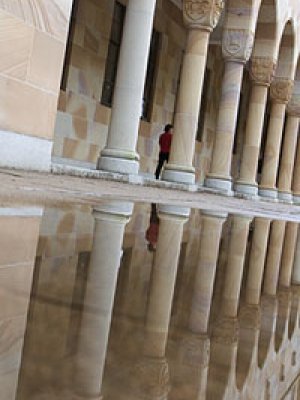
A team of 10 UQ undergraduate students is aiming to prove you don’t need to perform a rain dance to encourage the clouds to open.
The students, from the Faculty of Science and the Faculty of Engineering, Architecture and IT, have entered the International Genetically Engineered Machine competition (iGEM), requiring them to design a research project and build a biological machine.
Team member Michael Milevskiy said the enthusiastic UQ contingent had decided to undertake two projects, including producing rainmaking bacteria suitable for use in Australia.
“The bacteria cause rain by allowing the water vapour in the air to aggregate faster, speeding up the rainmaking process,” Mr Milevskiy said.
“These bacteria naturally do this in colder temperatures.
“Our hope is to make the bacteria more resistant to hotter temperatures.”
The team also hopes to produce bacteria capable of sucking mercury from contaminated water samples.
“The mercury would be sucked up by the bacteria and aggregate to the bottom of the water,” Mr Milevskiy said.
“It would then be a case of simply removing the clean layer of water on top.”
Fellow team member Katelin Haynes said both projects had significant commercial potential.
“This form of metal filtration can easily be applied to industries purifying metals and wanting to reuse the trace amounts of excess metal found in their wastewater,” Ms Haynes said.
“It can also be used to simply filter metals found in water, such as water sources near mines, making the water more drinkable.
“The rainmaking bacteria we intend to use are already being put to use in colder climates to make snow.
“Once we add heat resistance, our hope is for these bacteria to be able to commercially produce rain faster than the current technique of cloud seeding.”
Run by the Massachusetts Institute of Technology, the iGEM competition has this year attracted 112 entries from universities worldwide.
The competition culminates with each team presenting their concepts at the iGEM Jamboree in Boston in November.
“We hope that the whole team can attend the conference in MIT, as well as our supervisors,” Mr Milevskiy said.
“To achieve this, we need to attract sponsorship from as many sources as possible, to build up a lab with equipment and to fly every student to attend the conference at MIT in November.”
The students’ talents have extended beyond science into the realms of fundraising and an application for support backed by the School of Biomedical Sciences has attracted a gift of $10,000 from the Alumni Friends of The University of Queensland Inc.
Head of the School of Biomedical Sciences Professor Brian Key said that this funding, along with significant financial support from the School, would help establish a dedicated iGEM laboratory.
“This lab will be for the exclusive use of iGEM team members in 2009 and the years to come,” Professor Key said.
“Our School has committed to iGEM by providing this lab space and access to School staff and other facilities.
“The project has also received support from the Faculty of Science, the School of Biological Sciences, and the Centre for Educational Innovation and Technology.
“We are committed to providing opportunities for our high-achieving students and assisting them to ‘go global’ in the name of UQ Science.”
If you can help the iGEM team with funds or in-kind resources, please contact Michael Milevskiy on 0403 581 301 or michael.milevskiy@uqconnect.edu.au.
Media: Penny Robinson at UQ Communications (07 3365 9723, penny.robinson@uq.edu.au) or Robyn Humphreyes-Reid at School at the School of Biomedical Sciences (07 3365 2384, robyn.reid@uq.edu.au)




